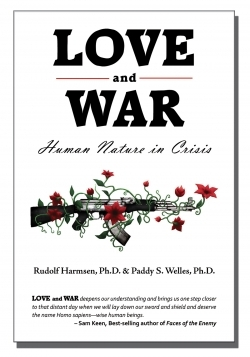Love and War
Human Nature in Crisis
“We each need to consider the price we are willing to pay for peace,” say Drs. Rudolph Harmsen and Paddy Welles. While war may be ingrained in the human psyche through evolution, they argue, peace remains possible. Like war, it just comes at a cost.
In their book Love and War; Human Nature in Crisis, Harmsen and Welles explain the insights biology, evolutionary theory, and psychology provide into why humanity rages war. Through evolution, they assert, people have developed the need to fight for survival. This leads to battles for resources and for greater opportunities to pass along one’s genes. Both the animal kingdom and tribal societies reveal how this has played out over time.
However, humanity also evolved the ability to love and to think beyond our immediate needs, the authors say. We can understand that working together peacefully provides better for everyone. By loving each other, caring for the needs of others, and talking through differences, humans can enjoy a world without war.
To support these arguments, the authors draw from their respective fields. Harmsen, a professor, biologist, and evolutionary ecologist, shares his knowledge of animal societies and his experience with primitive cultures. Welles, a professor and practicing family therapist with degrees in psychology and sociology, offers insights into how human evolution impacts behavior today.
Together, the authors provide a number of fascinating and insightful stories, ranging from chimpanzee political fights to how one tribal village avenges another’s past aggression. These stories, which include examples of modern-day family and gang feuds, add sparkle to a book that covers both scientific and rather philosophical subjects.
And the book offers a thought-provoking perspective: perhaps war and other forms of killing have an evolutionary basis. This should interest anyone in the fields of politics, sociology, or psychology. Unfortunately, unnecessary political jabs and the promotion of particular social policies seem to shadow that message with a larger agenda.
More significantly, the authors provide no real solutions. They call for peoples and nations to love one another, talk through their differences, and sacrifice for the greater good. However, they fail to offer serious proposals for how this is to be done, leaving the reader with what can feel like a utopian dream. Nevertheless, the book offers a fresh theory on the source of conflict in the world, one that proves fascinating to ponder.
Reviewed by
Diane Gardner
Disclosure: This article is not an endorsement, but a review. The publisher of this book provided free copies of the book and paid a small fee to have their book reviewed by a professional reviewer. Foreword Reviews and Clarion Reviews make no guarantee that the publisher will receive a positive review. Foreword Magazine, Inc. is disclosing this in accordance with the Federal Trade Commission’s 16 CFR, Part 255.

